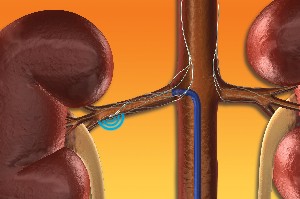Data from a clinical trial of a hypertension therapy using a catheter indicates the device significantly reduced the treated patients’ blood pressure compared to a control group. Results of the HTN-2 trial of the Symplicity system made by Ardian Inc. of Mountain View, California were reported at the American Heart Association Scientific Sessions 2010 and published in the journal The Lancet (paid subscription required).
The study showed that, after six months, patients treated with Ardian’s device experienced an average drop in blood pressure of 32/12 mmHg (systolic/diastolic millimeters of mercury) compared to an increase in blood pressure of 1/0 mmHg in the control group of patients treated with medications alone.
The HTN-2 trial was an international, multi-center, prospective, randomized, and controlled study of the safety and effectiveness of renal denervation (RDN) in patients with uncontrolled hypertension. RDN involves inserting a small catheter in the into the femoral artery in the upper thigh and threaded into the renal artery. Once in place in the renal artery, the device delivers low-power radio frequency energy to deactivate the surrounding renal sympathetic nerves. This, in turn, reduces hyper-activation of the sympathetic nervous system, which is often the cause of chronic hypertension. The one-time procedure aims to permanently reduce blood pressure.
In the trial, 106 patients were enrolled from 24 sites. At the start, the randomized treatment and control patients had similar high blood pressures: 178/97 mmHg and 178/98 mmHg, respectively, despite both receiving an average daily regimen of five antihypertensive medications. After six months, the average blood pressure of the RDN group was reduced to 146/85 mmHg, compared to an average blood pressure of 179/98 mmHg for the control group.
The study also found that the therapy was safe, with no serious device or procedure-related events, no cardiovascular complications, and no kidney-related complications.
* * *


 RSS - Posts
RSS - Posts
[…] This post was mentioned on Twitter by Alltop Science, Alan Kotok. Alan Kotok said: Trial Shows Catheter-Based Therapy Reduces Hypertension | #Science #Business http://t.co/35AUUYL #ScienceBusiness […]
Just keep in mind that you’re not alone. There’s assist out there should you want it for lowering blood pressure. Do not be afraid to reach out whether it is by means of support groups, doctors, therapists or any supportive environment that will help lead you back to health and wellness. You deserve to be healthy and happy. By performing some research, staying open-minded as well as the willingness to try new things, you’ll discover the path to bringing balance back into the body.
Donald E. Brown is my name I was told I have hbp, ten years ago. I started with one pill, now i take five and my BP is still high I need help and I tried everything.
I take blood pressure medication as well, so you have my sympathies. You may want to discuss with your physician taking part in a clinical trial of an experimental therapy, particularly if current drugs haven’t worked so far. Good luck.
I need some help to reduce my mother’s hypertension. Thanks all who shared their knowledge to add some plus to ill people’s life quality…
Thank you Ertan for your comment and for reading Science Business. Your best approach for your mother is to heed the instructions of her doctor, since there may be other conditions and factors at work. Good luck to you both. – Alan